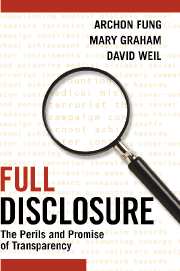Book contents
- Frontmatter
- Dediaction
- Contents
- List of Figures and Tables
- Preface
- 1 Governance by Transparency
- 2 An Unlikely Policy Innovation
- 3 Designing Transparency Policies
- 4 What Makes Transparency Work?
- 5 What Makes Transparency Sustainable?
- 6 International Transparency
- 7 Toward Collaborative Transparency
- 8 Targeted Transparency in the Information Age
- Appendix: EighteenMajor Cases
- Notes
- Bibliography
- Index
Preface
Published online by Cambridge University Press: 27 July 2009
- Frontmatter
- Dediaction
- Contents
- List of Figures and Tables
- Preface
- 1 Governance by Transparency
- 2 An Unlikely Policy Innovation
- 3 Designing Transparency Policies
- 4 What Makes Transparency Work?
- 5 What Makes Transparency Sustainable?
- 6 International Transparency
- 7 Toward Collaborative Transparency
- 8 Targeted Transparency in the Information Age
- Appendix: EighteenMajor Cases
- Notes
- Bibliography
- Index
Summary
Five years ago, we set out to explore a question of growing importance in public life: can government legislate transparency policies that reduce risks to health, safety, and financial stability, or improve the performance of major institutions such as schools, hospitals, and banks?
We were an unlikely trio – a political scientist, an economist, and a lawyer, each busy with our own research concerning new trends in participatory democracy, workplace practices, and regulatory policy. But all of us were based, serendipitously, at the Kennedy School's Taubman Center for State and Local Government at Harvard University. We began meeting every couple of weeks to talk about an intriguing development that each of us had noted separately in our work. Faced with challenges to reduce serious risks or improve public services, legislators were no longer simply setting standards or imposing taxes. They were also creating scores of public disclosure policies.
In effect, policymakers were honing transparency – a widely shared but amorphous value – into a refined instrument of governance. This trend raised a fundamental question that no one seemed to be asking: does transparency work? Can new information – placed in the public domain and structured by government mandate – improve consumers’, investors’, and voters’ choices and, in turn, create new incentives for manufacturers, hospitals, schools, and other organizations to bring their practices more in line with public priorities? We decided to examine that question together.
As we framed our research project, transparency policy failures with devastating consequences helped convince us that the inquiry was important. In 2001, Enron Inc., the world's largest energy trading firm, collapsed. To prosecutors, Enron's demise represented fraudulent efforts by executives to hide huge losses from investors. To many investors, it represented the loss of life savings. To us, however, the Enron debacle also signaled a failure of the nation's oldest and most trusted transparency system – the detailed federal requirements that publicly traded companies disclose their profits and losses. Enron's demise was followed quickly by the sudden collapse of other respected companies – WorldCom and Tyco, for example – incidents that underscored the flaws in financial reporting.
Over the next two years, the Bush administration's attempt to employ transparency to reduce risks of death and injury from terrorist attacks also failed. The tragedy of the terrorist attacks of September 11, 2001, was leavened by the grace and courage of citizen heroes.
- Type
- Chapter
- Information
- Full DisclosureThe Perils and Promise of Transparency, pp. xi - xviiiPublisher: Cambridge University PressPrint publication year: 2007
- Creative Commons
- This content is Open Access and distributed under the terms of the Creative Commons Attribution licence CC-BY-NC 4.0 https://creativecommons.org/cclicenses/



